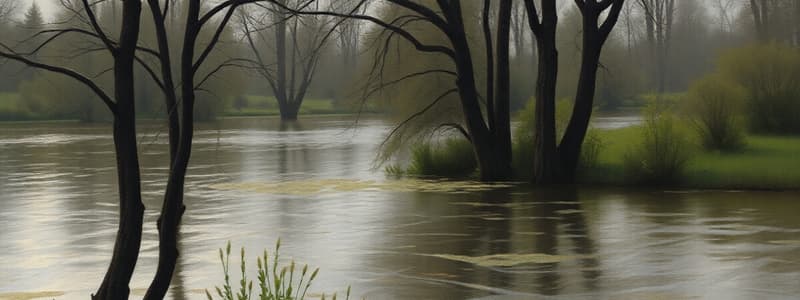Podcast
Questions and Answers
What is the primary focus of water resource engineers?
What is the primary focus of water resource engineers?
- Developing urban infrastructure unrelated to water
- Manufacturing water purification chemicals
- Assessing, managing, and conserving water resources (correct)
- Designing transportation systems
Which of the following is NOT a responsibility of water resource engineers?
Which of the following is NOT a responsibility of water resource engineers?
- Conducting geological surveys for mining (correct)
- Designing flood control systems
- Monitoring water quality
- Managing systems for clean water supply
How do water resource engineers contribute to environmental sustainability?
How do water resource engineers contribute to environmental sustainability?
- By restoring wetlands and protecting aquatic habitats (correct)
- By maximizing water extraction for industrial use
- By removing wetlands for urban development
- By constructing dams without considering ecological impacts
Which type of water-resource engineer specializes in the management of coastlines?
Which type of water-resource engineer specializes in the management of coastlines?
What strategies do water resource engineers develop to address water scarcity?
What strategies do water resource engineers develop to address water scarcity?
What aspect of public health is managed by water resource engineers?
What aspect of public health is managed by water resource engineers?
What type of engineer primarily focuses on the distribution and treatment of water?
What type of engineer primarily focuses on the distribution and treatment of water?
Hydrologists are primarily concerned with the study of what aspect of water?
Hydrologists are primarily concerned with the study of what aspect of water?
What is the primary role of hydraulic engineers?
What is the primary role of hydraulic engineers?
Which engineering role specializes in the management of rivers and watercourses?
Which engineering role specializes in the management of rivers and watercourses?
What type of engineer focuses on the treatment and disposal of wastewater?
What type of engineer focuses on the treatment and disposal of wastewater?
Which engineer is responsible for designing systems to control stormwater impacts?
Which engineer is responsible for designing systems to control stormwater impacts?
Who focuses on monitoring and improving the quality of water in natural bodies?
Who focuses on monitoring and improving the quality of water in natural bodies?
What is the main focus of environmental engineers?
What is the main focus of environmental engineers?
Which type of engineer is engaged in the long-term management of water resources at a watershed level?
Which type of engineer is engaged in the long-term management of water resources at a watershed level?
What do groundwater engineers primarily deal with?
What do groundwater engineers primarily deal with?
What is one of the primary responsibilities of water resource engineers?
What is one of the primary responsibilities of water resource engineers?
How do water resource engineers help protect communities from floods?
How do water resource engineers help protect communities from floods?
Why is efficient irrigation system design important in agriculture?
Why is efficient irrigation system design important in agriculture?
What role do water resource engineers play in renewable energy generation?
What role do water resource engineers play in renewable energy generation?
Which of the following is NOT a responsibility of water resource engineers?
Which of the following is NOT a responsibility of water resource engineers?
Which skill is essential for water resources engineers to understand how water moves through the environment?
Which skill is essential for water resources engineers to understand how water moves through the environment?
What must water resource engineers monitor to protect aquatic ecosystems?
What must water resource engineers monitor to protect aquatic ecosystems?
In developing sustainable water management strategies, which factor is NOT typically considered?
In developing sustainable water management strategies, which factor is NOT typically considered?
What is a primary application of Geographic Information Systems (GIS) in water resources engineering?
What is a primary application of Geographic Information Systems (GIS) in water resources engineering?
Which tool is primarily used for flood forecasting and stormwater management?
Which tool is primarily used for flood forecasting and stormwater management?
What essential skill is crucial for water resources engineers when overseeing large projects?
What essential skill is crucial for water resources engineers when overseeing large projects?
Which quality is vital for water resources engineers in relation to environmental protection?
Which quality is vital for water resources engineers in relation to environmental protection?
What is the main purpose of hydraulic modeling software?
What is the main purpose of hydraulic modeling software?
Why is teamwork important in water resources engineering?
Why is teamwork important in water resources engineering?
What ethical responsibility do water resources engineers prioritize?
What ethical responsibility do water resources engineers prioritize?
What characteristic must water resources engineers possess to adapt to the evolving field?
What characteristic must water resources engineers possess to adapt to the evolving field?
What is the main purpose of a SCADA system in water management?
What is the main purpose of a SCADA system in water management?
Which technique is NOT associated with watershed management?
Which technique is NOT associated with watershed management?
Which challenge is primarily concerned with the legal aspects of water management?
Which challenge is primarily concerned with the legal aspects of water management?
What technique can be employed to reduce flood risk?
What technique can be employed to reduce flood risk?
Which strategy is important for engineers to address challenges posed by climate change?
Which strategy is important for engineers to address challenges posed by climate change?
What is a key factor that influences groundwater management?
What is a key factor that influences groundwater management?
Which of the following is NOT a technique used in hydraulic design?
Which of the following is NOT a technique used in hydraulic design?
What is one of the effects of climate change on water management that engineers must consider?
What is one of the effects of climate change on water management that engineers must consider?
Flashcards are hidden until you start studying
Study Notes
Overview of Water Resource Engineering
- Water resource engineers specialize in the assessment, management, and conservation of water resources focusing on sustainability and quality.
- Their work involves developing strategies for optimal utilization and protection of water sources.
Significance of Water Resource Engineering
- Ensuring Water Supply and Quality: Design and manage infrastructures like reservoirs and treatment plants to provide clean drinking water while monitoring for contamination issues.
- Flood Risk Management: Design flood control systems, such as levees and drainage systems, to mitigate flooding risks and manage water scarcity.
- Environmental Sustainability: Balance human water needs with ecological protection by restoring wetlands and protecting aquatic habitats.
Types of Water Resource Engineers
- Water Engineer: Plans and oversees water infrastructure systems including supply, treatment, and distribution.
- Hydrologist: Studies water distribution and properties, providing crucial data on water behavior for engineers.
- Coastal Engineer: Focuses on coastal infrastructure, managing erosion and mitigating storm surge impacts.
- Environmental Engineer: Addresses ecological impacts, pollution control, and sustainability in water management.
- Water Supply Engineer: Designs and manages systems for extracting, treating, and distributing water for diverse uses.
- Hydraulic Engineer: Analyzes fluid movement to design efficient water conveyance and hydraulic structures.
- Stormwater Engineer: Manages rainwater and runoff through drainage systems and retention solutions.
- Wastewater Engineer: Specializes in systems for treating and disposing of wastewater.
- Water Quality Engineer: Focuses on monitoring and improving water quality through treatment system design.
- Groundwater Engineer: Explores and manages groundwater resources, designing systems for sustainable use.
- River Engineer: Manages rivers through projects related to channel design and floodplain management.
- Water Resources Planner: Engages in long-term planning considering sustainability and population growth.
Importance of Water Resource Engineering
- Access to Clean Water: Essential for public health; engineers manage sources and distribution systems to prevent contamination.
- Flood Protection: Engineers design systems to minimize flood damage to properties and lives.
- Agricultural Support: Develop efficient irrigation systems necessary for food security.
- Renewable Energy Generation: Crucial role in designing hydropower systems that harness water energy sustainably.
- Environmental Protection: Ensure water quality management and ecosystem health through various design strategies.
Essential Skills and Qualities
- Technical Expertise: In fields such as hydrology, hydraulics, water quality analysis, and GIS for effective water resource management.
- Problem-Solving Abilities: Creative solutions to complex water management challenges are crucial.
- Communication Skills: Ability to present technical data clearly to stakeholders and the public.
- Project Management: Oversee projects requiring strong organizational and time-management skills.
- Teamwork: Collaborate across disciplines for successful project outcomes.
- Key Qualities: Passion for the environment, adaptability to evolving practices, leadership, and ethical responsibility are essential traits.
Important Tools
- Geographic Information Systems (GIS): Map and analyze spatial data for effective water management.
- Hydrological and Hydraulic Modeling Software: Helps in predicting water movement, flood forecasting, and system design.
- SCADA Systems: Monitor and control water management systems in real-time for optimal performance.
Techniques in Water Resource Management
- Watershed Management: Employ methods like afforestation and soil conservation practices to control runoff and water quality.
- Flood Risk Assessment: Use floodplain zoning and construction of barriers to reduce flood risks.
- Groundwater Management: Techniques include artificial recharge and aquifer recovery to sustain groundwater use.
- Hydraulic Design: Focus on designing structures for effective water control and flow management.
Challenges in Water Resource Engineering
- Regulatory Changes: Adapting to new environmental laws and regulations is a continual challenge.
- Technological Advancements: Rapid developments require ongoing skill enhancements and technological integration.
- Climate Change: Engineers must design adaptive water systems considering altered weather patterns and resource availability.
- Resource Management: Balancing limited water supplies with ecological preservation poses significant challenges.
- Public Perception: Engaging stakeholders and securing public support for projects is crucial for their success.
Strategies for Overcoming Challenges
- Lifelong Learning: Commitment to continuous education and certification programs to stay abreast of changes and innovations.
- Embracing Technology: Collaborate with tech entities and engage in new technological learning to enhance project solutions.
- Climate Change Planning: Incorporate future climate conditions in the design of adaptive water management systems.
Studying That Suits You
Use AI to generate personalized quizzes and flashcards to suit your learning preferences.




